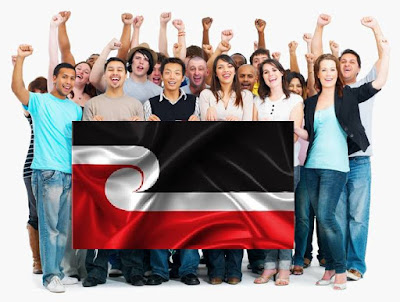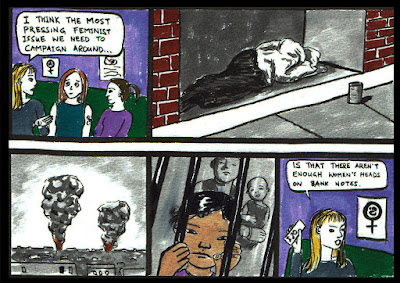A Slice of Waitangi
One
of the reasons Leeland moved away was because of the ghosts. Pakeha
ghosts to be precise. Less pakeha, less ghosts – went the plan.
White
seduction, golden maps and hemisphere migration had sacrificed his
ancestral tongue. He got an English one instead – complete with
Kiwi twang and mumble. It had served him well. It also meant pakeha
ghosts took a liking to him. Leeland often wondered if he had known
his mother tongue, would Chinese ghosts speak to him too.
Leeland
felt the Maori spirits stirring. That wasn't a special thing about
him, everyone could feel them, coudn't they?
Especially
today. Waitangi Day. Day where the pakeha got prickly, and the
'others' were confused and vulnerable to pakeha angst in the media.
Day where Papatuanuku tugged at her children up through the soles of
their feet and gripped the crowns on their heads.
Leeland,
like many men, excepting his father, didn't cry much. Not because he
refused to, but because feelings that rode with tears, didn't make it
up far enough from his chest to his eyelids.
The
karanga was like a magnet that made all his tears feel like they
would spill not just out his eyes, but out of his skin. He could
feel all the passed before, running their fingers and breath all over
the tiny hairs on his body as they were called onto the marae by the
haunting, realm-crossing call.
Maori
ghosts didn't talk to him, they didn't need to. Their stories were
ready on the lips of their descendents, written in tears on so many
parchments, and all online now too. It was in the soil, and chanted
by trees, rivers, lakes and mountains if you knew how to listen.
It
was the pakeha ghosts that had so much to say. Their descendents
that had silenced their song, sought to erase it. The tales,
ordeals, sacrifices and crimes of their migration journeys and new
settlements barely six generations back. Time doesn't mean much for
ghosts. And they found Leeland's tongue. Made him sing their
mournful ballads, and listen to their stories.
At
first it terrified Leeland. Then he was angry.
Leeland
couldn't speak to his own living grandmothers as they had different
languages in their mouths and ears. Yet these pakehas ghosts,
demanding in passing, as in life, followed him around until they'd
spoken and sung enough to move on. Everyone needs an audience.
So
he watched. Used this ghostly gleaned knowledge to supplement in
living conversations. Ghosts spoke with their bodies, or the shapes
and whisps of their bodies. Spoke emotion like that. Leeland tried
to stitch the holes in the living pakehas with his words. The
pakehas were hurting, dead and alive. So like school yard bullies,
played it out on the backs of Maori. And Maori, dead and alive,
continued to struggle.
Against the battering rams of Westminster
Law, privatised prisons, poisonous health care and lobotomising,
heart-dehydrating curriculum, the people of the land continued. And
the earth sung to them quietly in caress, balm to wounded souls.
Leeland knew the land would never stop singing to her children. And
those songs made him weep.
You
had to pick a side.
You
couldn't live with your eyes and ears open, and not realise what's
going on. But once you picked that side, you realised it wasn't
about sides. It was about remembering. The memories that live
through bodies, and words, and actions, and refuse to be erased or
re-written.
And
the bully stomped on and threw its toys.
There aren't really sides to understanding. Being quite short seemed to help Leeland. Easier to
not get caught in tall poppies heads being chopped off.
Standing
underneath the rhetoric, propoganda, denial and hot-air, to see where
it's all leading.
For wounds to heal, the thorn must be removed; not
ignored and 'moved on from'. Common sense really. Unfortunately
commonsense was not so common these days.
In
time Leeland realised it was merely a price for living on this
contested lands. Though he wasn't a pakeha, to Maori maybe they were
all colonial settlers. White, yellow, red, black, rainbow,
off-white. So he tried to pay his part, taxes and rent perhaps.
Someone had too. The price was too great and could never be repaid,
but maybe the act of trying spoke in volumes.
So
he hoped.


Brilliant. Kia ora!
ReplyDeleteRobb
What a great story! I feel like this has been inspired, at least in part, by John Key's idiotic statements at Waitangi this year. Move on? Really John, where should we move on to? Move on and keep making you and your cronies rich while our people see no significant improvement? Anyway, awesome story! Nga mihi!
ReplyDeleteThank you.
ReplyDelete